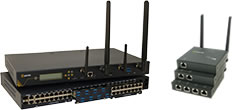IoT trackers enter the workplace
By Max BurkhalterFebruary 23, 2017
Devices connected to the Internet of Things are transforming the workplace, facilitating the automation of mission-critical business processes and bolster employee efficiency. Consequently, enterprises across all sectors are expected to spend nearly $5 trillion on IoT technology over the next five years, according to research from Business Insider.
While many of these organizations are focused on adopting more traditional devices such as smartphones and tablets, others are moving in more innovative directions, integrating experimental tools that may open up more impactful possibilities. Members of the latter group are particularly focused on IoT technology that facilitates employee tracking, Bloomberg reported. This is a polarizing potential usage case, as these connected devices test the boundaries of workplace privacy norms.
Pushing for increased efficiency
Boston Consulting Group is one of the numerous businesses beta testing IoT employee trackers. Earlier this year, the company distributed identification badges containing microphones and location trackers to 100 volunteers in its New York office. Why? The firm aims to collect actionable data on how employees communicate in the workplace and plans to use this information for an eventual interior redesign project.
The Boston-based technology firm Humanyze developed the devices, which collect randomized data on user speech patterns and travel tendencies. This kind of data can come in handy when creating a workspace meant to facilitate optimal efficiency. Humanyze CEO Ben Warber recently compared the rise of actionable employee productivity data to the statistical revolution that once transformed professional baseball in an article published in the MIT Sloan Management Review.
"Some organizations are adopting IoT technology particularly focused on IoT technology that facilitates employee tracking."
"I think business as a whole is, ironically, in a similar state to where baseball was over a decade ago," Warber explained. "We're finally starting to have the ability to collect data on what we actually do when we're at work - because we carry cellphones around with us and we have email, IM, phone call data, internal social media data and now, increasingly, sensors that tell us how we actually collaborate with each other."
To individuals like Warber and the executives at BCG, advanced data-collection tools create new opportunities for improvement and allow workers to better understand how they function within an organization. However, the privacy issues that come along with these devices may cancel out their effectiveness, according to some.
Addressing the eye in the sky
Opponents contend that IoT trackers and similar tools infringe on employee privacy and have the potential to facilitate corporate abuse. Indeed, recent events have confirmed this possibility. In 2015, one sales executive sued her former employer, contending the company terminated her because she had turned off a mobile application meant to track employee whereabouts, The Washington Post reported.
With these situations in mind, many employees resist in some way, hoping to avoid constant detection. That's exactly what the staff of a London newspaper did last year when they discovered devices in their cubicles that recorded when they were at their workstations, according to Bloomberg. Executives at the publication argued the fixtures were being used to more effectively control heating and cooling costs. Despite this sounding rational, they were forced to shutter the initiative, failing to overcome bad optics and pressure from trade organizations.
Warber and others in the field push back against this perspective, arguing that data randomization technology and restricted data access protocols - two features that accompany all Humanyze products - protect against corporate abuse.
Tracking the future
As more organizations experiment with these devices, this battle will surely intensify. Either way, it appears enterprise IoT technology adoption will continue to grow in the coming years. Perle offers key components such as console servers, Ethernet extenders and fiber media converters that form the backbone for IoT-ready internal networks. Contact us today to learn more.



